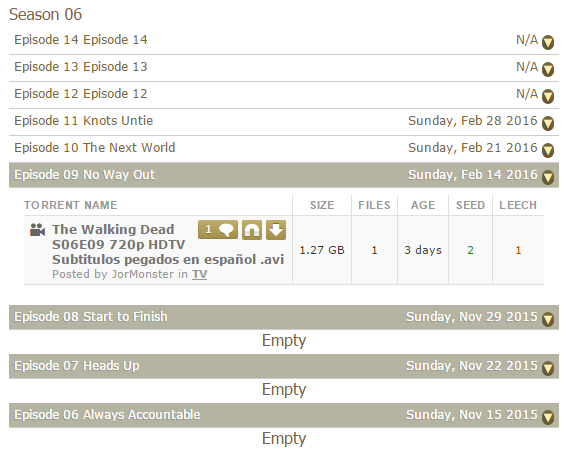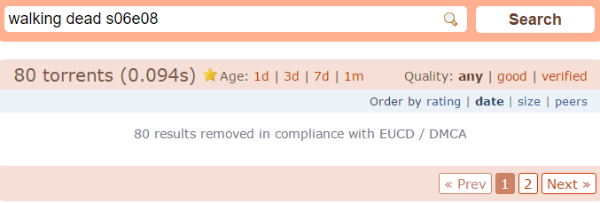Fancy an Anti-Piracy Threat….To Your Dropbox Email Address?
mardi 23 février 2016 à 22:29 There are many different ways that people are able to share files online and they broadly fall into two categories – public and private.
There are many different ways that people are able to share files online and they broadly fall into two categories – public and private.
Public sharing is generally carried out using peer-to-peer networks such as BitTorrent. Anyone participating in a torrent swarm should be aware that unless they take precautions by using a VPN or proxy, their IP address is visible to all of the other people engaged in the same act.
Private sharing can also take many forms, from exchanging content via email to uploading and downloading content from invite-only servers, for example. While it has to be noted there are always weak leaks, this kind of sharing usually receives less interest from anti-piracy companies as it tends to be scattered and somewhat cost ineffective to police.
That being said, Dutch anti-piracy outfit BREIN has just managed to scare an unnamed number of pirates after they participated in a presumed-private sharing circle that utilized Dropbox for exchanging copyrighted content.
The story traces back to December 2015 when BREIN obtained an ex parte court order against a man they accused of being the administrator of a Dropbox account that was being used to distribute copyrighted eBooks.
It was alleged that the man was active on a number of Internet forums and on request granted fellow members with access to said account in order to download titles without paying. After a complaint from BREIN the court found this behavior unacceptable and ordered the man, in his absence, to cease his activities or face fines of 2,000 euros per day up to a maximum of 50,000 euros.
However, as previously reported, BREIN is now regularly striking private settlement deals with people it also targets in court. It’s not known if there was a financial arrangement in this particular case but quite clearly BREIN has been able to leverage its position to scare the individuals that had been downloading from the Dropbox account.
Since those downloading from the eBook-filled Dropbox folder were required to give up their email addresses to the person administering the account, they became vulnerable when BREIN discovered his identity. So, as part of the settlement deal, BREIN was then able to contact those individuals with a custom threat, direct to an email address they had previously considered private.
“BREIN has recently found that you are a user (or: Member) of the Dropbox account called ‘—‘, offered by ‘—‘. Your email address is visible to third parties and by BREIN for the purpose of sending you this email,” the email to the assumed pirates begins.
“Without permission of the copyright holders this account was used for sharing copies of eBooks, which is not lawful. The administrator was (as the owner and administrator) responsible for this and the judge has ruled that this person has infringed on the rights of the copyright holders BREIN represents.”
The Dropbox users are then informed that they too have almost certainly infringed copyright due to them downloading copyrighted content from an illegal source and they should therefore consider purchasing their content from legal sources in the future.
“BREIN received several positive responses to [these emails] and it also seems that the exchange of ebooks via the forums that BREIN found in its research has almost completely ceased,” the group said in a statement.
While there’s no suggestion that BREIN intends to take matters further, it seems clear that those sharing or obtaining copyrighted content even from a Dropbox account should be aware that if the person they’re downloading from caves in, their email address (at the very least) could be vulnerable to threats. If that email then correlates with other information available on the web, things certainly have the potential to escalate.
Source: TF, for the latest info on copyright, file-sharing, torrent sites and ANONYMOUS VPN services.
 Despite sending notices requesting the removal of
Despite sending notices requesting the removal of  Following a series of High Court orders obtained since 2012, six of the UK’s major ISPs are required to block access to dozens of the world’s most popular ‘pirate’ sites.
Following a series of High Court orders obtained since 2012, six of the UK’s major ISPs are required to block access to dozens of the world’s most popular ‘pirate’ sites.
 Last week the The Walking Dead’s sixth season resumed. As the second
Last week the The Walking Dead’s sixth season resumed. As the second 

 When mentioned by US-based entertainment companies, Russian social networking giant vKontakte is often portrayed as a poor copyright partner that does little to deal with the huge amounts of infringement on its platform.
When mentioned by US-based entertainment companies, Russian social networking giant vKontakte is often portrayed as a poor copyright partner that does little to deal with the huge amounts of infringement on its platform.